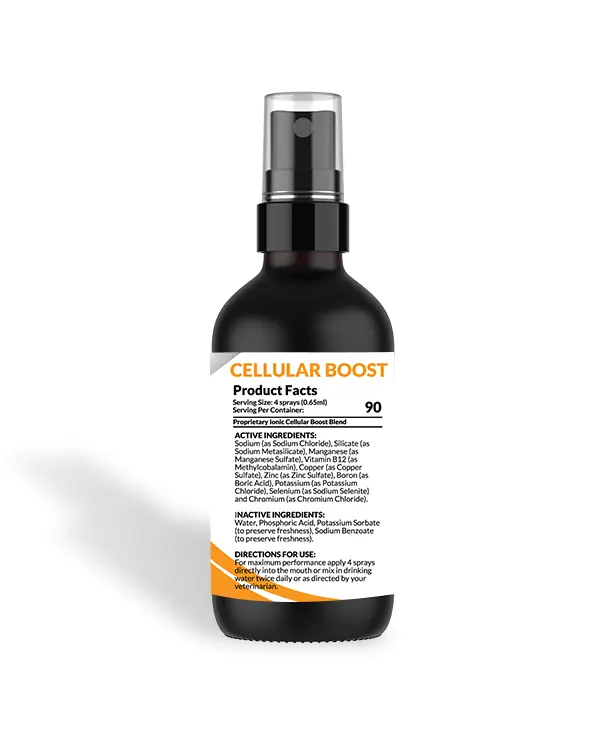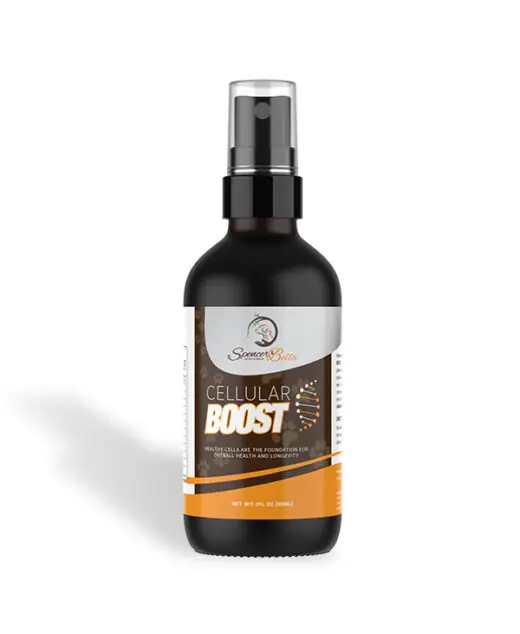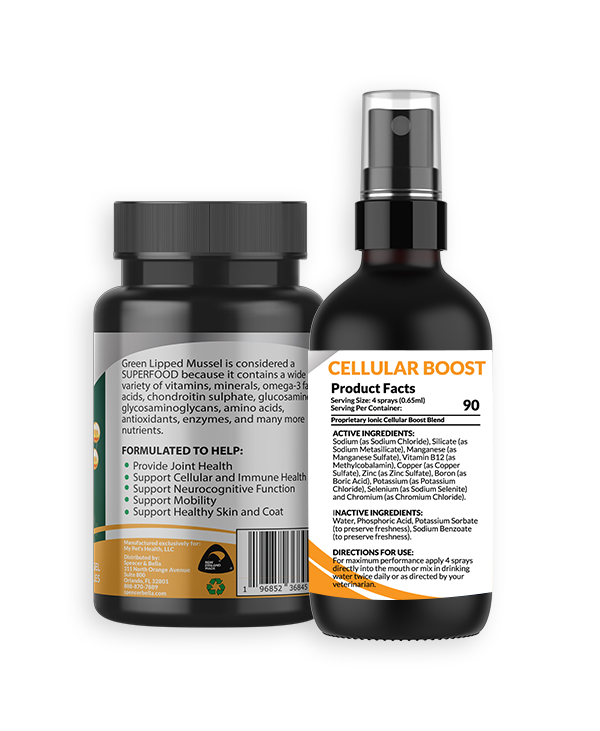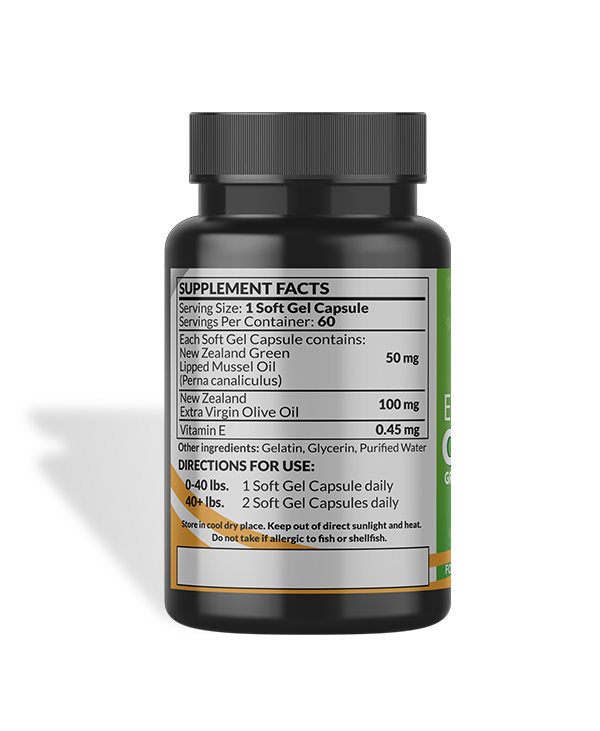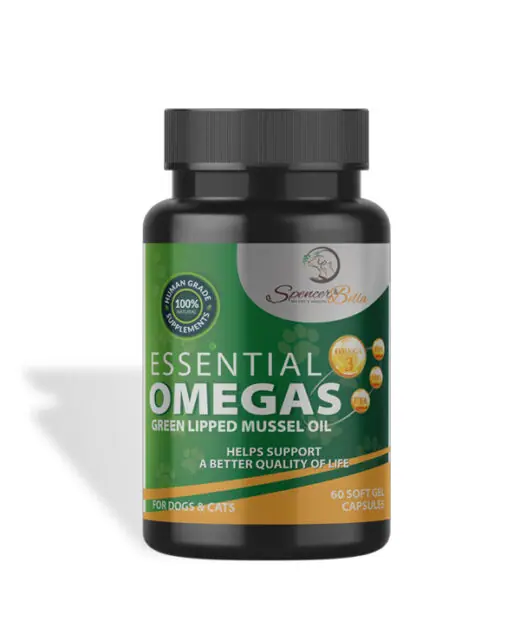Inflammation, sometimes referred to as the “silent killer” in dogs and cats, is a critical health issue that can go unnoticed for extended periods, leading to serious complications. Although inflammation is a natural response to injury or infection, chronic or excessive inflammation can pave the way for various health problems in our furry friends, including arthritis, allergies, diabetes, heart disease, and even cancer.
The journey of inflammation in pets often begins early in their lives and can progressively manifest as they age. Numerous factors can trigger chronic low-grade inflammation, such as inadequate nutrition, exposure to environmental toxins, stress, and genetic predisposition. Over time, this persistent inflammation may cause damage to tissues and contribute to the development of chronic diseases.
Why is Inflammation a Concern for Your Beloved Pets?
For instance, young puppies and kittens may become more vulnerable to inflammation if they are not provided with the right nutrition, such as diets high in processed foods or lacking essential nutrients. Exposure to environmental toxins like pollution, pesticides, and household chemicals can also contribute to inflammation in young animals. Additionally, stress arising from separation from their mother or littermates can play a role in triggering inflammation.
As our pets age, they may face an increased likelihood of developing chronic conditions like arthritis, periodontal disease, and kidney disease, all of which can be exacerbated by inflammation. In some unfortunate cases, chronic inflammation may even play a role in the development of cancer in pets.
Health Issues of Inflammation in Cats
Inflammation can give rise to a host of health issues in cats. Common problems caused by inflammation in cats include:
- Arthritis: Inflammation in the joints can lead to pain, stiffness, and reduced mobility in cats, particularly among older cats or those with underlying joint issues.
- Skin allergies: Allergic reactions to food or environmental allergens can trigger skin inflammation and irritation in cats, causing symptoms like itching, redness, and hair loss.
- Inflammatory bowel disease: A chronic condition marked by inflammation of the digestive tract, leading to symptoms like vomiting, diarrhea, weight loss, and other gastrointestinal issues in cats.
- Respiratory infections: Inflammation of the respiratory system can result in coughing, sneezing, and other respiratory symptoms in cats, especially if they have been exposed to viruses or pathogens.
- Chronic kidney disease: Inflammation may contribute to the development and progression of kidney disease in cats, leading to increased thirst, reduced appetite, and weight loss.
Most Common Health Issues of Inflammation in Dogs
In dogs, inflammation can also give rise to various health issues, including:
- Arthritis: Inflammation in the joints can lead to pain, stiffness, and reduced mobility in dogs, especially among older dogs or those with underlying joint problems.
- Skin allergies: Dogs may experience skin inflammation and irritation due to allergic reactions to food or environmental allergens, resulting in symptoms like itching, redness, and hair loss.
- Inflammatory bowel disease: Like cats, dogs can also suffer from this chronic condition characterized by inflammation of the digestive tract, leading to symptoms like vomiting, diarrhea, weight loss, and other gastrointestinal problems.
- Respiratory infections: Inflammation of the respiratory system can cause dogs to cough, sneeze, and display other respiratory symptoms, particularly if they have been exposed to viruses or pathogens.
- Chronic kidney disease: Dogs may develop kidney disease due to inflammation, leading to symptoms like increased thirst, reduced appetite, and weight loss.
- Periodontal disease: Inflammation of the gums and teeth can lead to periodontal disease in dogs, causing issues like tooth loss, gum recession, and other dental problems.
Less Common Inflammatory Issues in Cats and Dogs
Although these are the most common inflammatory conditions, there are other less frequent yet noteworthy health issues that may arise due to inflammation in dogs and cats.
These include:
For dogs, these less common inflammatory conditions include:
- Dog inflamed paws, which can cause discomfort, limping, and excessive licking.
- Inflamed ears on dogs, including swollen inner ears, affecting their balance and coordination, leading to symptoms like head shaking and ear scratching.
- Inflamed toes on dogs can cause limping, swelling, and pain.
- Inflamed liver in dogs, which can result in jaundice, loss of appetite, and lethargy.
- Inflamed bowel in dogs, leading to digestive issues and discomfort.
- Inflamed colon in dogs, resulting in gastrointestinal problems.
- Inflamed eye on dogs, such as uveitis, requiring specialized treatment to preserve vision.
- Inflamed paw pad on dogs, causing discomfort and sensitivity.
On the other hand, less common inflammatory conditions in cats comprise:
- Inflamed liver in cats, known as hepatitis, leading to jaundice, loss of appetite, and lethargy.
- Inflamed bladder in cats, causing frequent urination and discomfort.
- Inflamed colon in cats, resulting in digestive issues and discomfort.
- Inflamed anus in cats, leading to discomfort and redness.
- Inflamed pancreas in cats, causing abdominal pain, vomiting, and decreased appetite.
- Inflamed eyelid in cats, resulting in redness, irritation, and squinting.
- Inflamed vulva in female cats, leading to swelling and discomfort.
Though less common, recognizing and addressing these inflammatory health concerns are essential to ensure our pets’ well-being and happiness.
The Impact of Chronic Inflammation on Pets’ Health
Understanding the implications of chronic inflammation on pets’ health is crucial for early detection and effective management. Inflammation is a natural and essential part of the body’s defense mechanism, helping to protect against injury and infection. However, when inflammation becomes chronic and remains uncontrolled, it can lead to a cascade of detrimental effects.
The Role of Inflammation in Arthritis
Arthritis, a common health issue in both cats and dogs, is linked to chronic inflammation. Inflammation of the joints can cause pain, swelling, and stiffness, reducing your pet’s mobility and negatively impacting their overall quality of life. As pets age, the wear and tear on their joints may increase, leading to a higher risk of arthritis.
Cats, especially senior felines, are prone to developing arthritis due to the natural aging process and potential injuries or traumas they may have experienced throughout their lives. For dogs, certain breeds are more susceptible to joint issues, and excessive weight can also contribute to the development of arthritis.
Allergies and Inflammation in Pets
Skin allergies are another common consequence of chronic inflammation in pets. Both cats and dogs can develop allergies to various environmental factors, such as pollen, dust mites, and certain ingredients in their food. These allergies trigger an immune response that leads to skin inflammation, resulting in itching, redness, and hair loss.
In some cases, pets may excessively scratch or chew at their skin, causing further damage and potentially leading to skin infections. Identifying and managing these allergies is essential to reduce inflammation and improve your pet’s comfort and well-being.
Inflammatory Bowel Disease (IBD) in Cats and Dogs
Inflammatory Bowel Disease (IBD) is a chronic condition characterized by inflammation in the gastrointestinal tract. Cats and dogs with IBD may experience symptoms like vomiting, diarrhea, weight loss, and reduced appetite. The exact cause of IBD is often challenging to determine, but it is believed to involve an abnormal immune response to certain foods or substances in the digestive tract.
Chronic inflammation in the gastrointestinal tract can lead to tissue damage and an impaired ability to absorb nutrients properly. Managing IBD typically involves dietary modifications, medications to reduce inflammation, and careful monitoring of your pet’s condition.
Respiratory Infections and Inflammation
Respiratory infections can occur in both cats and dogs, particularly in environments with a higher risk of exposure to viruses or other pathogens. Inflammation of the respiratory system can cause symptoms like coughing, sneezing, nasal discharge, and difficulty breathing.
Young animals, older pets, and those with weakened immune systems are more susceptible to respiratory infections. Vaccinations and proper hygiene measures can help reduce the risk of infection and subsequent inflammation in your furry companions.
The Impact of Inflammation on Kidney Health
Chronic inflammation can play a significant role in the development and progression of kidney disease in both cats and dogs. Kidney disease, or renal failure, is a common health concern among older pets. Inflammation within the kidneys can lead to impaired kidney function and eventual kidney failure if left unaddressed.
Symptoms of kidney disease may include increased thirst, excessive urination, decreased appetite, weight loss, and lethargy. Early detection and management of kidney disease can help slow its progression and improve your pet’s quality of life.
Dental Health and Periodontal Disease
Inflammation also plays a critical role in the development of periodontal disease in dogs. Poor dental hygiene can lead to the accumulation of plaque and tartar on your dog’s teeth, triggering an inflammatory response in the gums. Over time, this inflammation can progress to periodontal disease, causing symptoms like gum recession, tooth loss, and pain.
Regular dental care, including professional cleanings and daily brushing, can help prevent periodontal disease and reduce inflammation in your dog’s mouth.
Chronic inflammation can have far-reaching effects on the health and well-being of our beloved pets. Early detection and proactive management are key to addressing inflammation-related conditions effectively. As responsible pet owners, it is essential to remain vigilant about our pets’ overall health and promptly seek veterinary care if any signs of inflammation or related issues arise.
Managing Inflammation in Pets: Treatment Options and Lifestyle Adjustments
Addressing inflammation in pets requires a comprehensive approach that involves veterinary care, proper nutrition, and lifestyle adjustments. By taking the initiative, pet owners can effectively manage inflammation-related conditions and improve their furry companions’ overall well-being.
Veterinary Care and Treatment Options
When it comes to managing inflammation in pets, seeking professional veterinary care is essential. Veterinarians can conduct a thorough examination, assess your pet’s overall health, and determine the best course of action based on the specific condition and severity of inflammation.
Treatment options may include:
- Anti-Inflammatory Medications: In cases of severe or chronic inflammation, veterinarians may prescribe anti-inflammatory medications to reduce pain, swelling, and discomfort. These medications can be particularly helpful for managing conditions like arthritis and respiratory inflammation.
- Allergy Management: For pets with allergies and skin inflammation, identifying and managing the allergen is crucial. Your veterinarian may recommend a special hypoallergenic diet, allergy testing, or medications to alleviate allergic symptoms and reduce skin inflammation.
- Dietary Modifications: Inflammatory Bowel Disease (IBD) in cats and dogs often benefits from dietary changes. Specialized diets that are easily digestible and formulated to reduce inflammation can help manage gastrointestinal symptoms.
- Supplements: Some pets may benefit from supplements that support joint health and reduce inflammation, such as Omega-3 fatty acids and glucosamine.
- Uveitis Treatment: Uveitis, an inflammation of the eye, requires prompt and specialized treatment to preserve vision. Depending on the cause and severity of uveitis, your veterinarian may prescribe eye drops or other medications to manage the inflammation.
- Dental Care: Proper dental care and regular professional cleanings can prevent periodontal disease and the associated inflammation in your pet’s mouth.
Nutrition and Lifestyle Adjustments
A crucial aspect of managing inflammation in pets is providing them with a balanced and nutritious diet. Opting for high-quality pet food that is free from potential allergens and rich in essential nutrients can support your pet’s overall health and immune system.
Consider the following nutrition and lifestyle adjustments:
- Premium Formulated Health Products: Incorporate premium formulated health products designed to promote joint health, skin and coat health, and overall well-being. These products can provide the necessary nutrients to support your pet’s health and combat inflammation.
- Weight Management: Maintaining a healthy weight is essential, especially for pets with joint issues. Excess weight can exacerbate inflammation and put strain on their joints. Your veterinarian can recommend a suitable diet and exercise plan to help your pet maintain a healthy weight.
- Regular Exercise: Engaging in regular exercise can help reduce inflammation and support your pet’s joint health. Depending on your pet’s age and physical condition, consult with your veterinarian to determine the appropriate exercise regimen.
- Stress Reduction: Minimizing stress and providing a calm environment can contribute to reducing inflammation in your pet. Cats and dogs are sensitive to changes in their surroundings, so ensuring a peaceful and safe living space is essential.
- Hydration: Ensure your pet has access to fresh, clean water always. Proper hydration is vital for overall health and can aid in reducing inflammation.
- Regular Check-ups: Schedule regular check-ups with your veterinarian to monitor your pet’s health and address any potential inflammation-related issues promptly.
Unlocking the Power of Cellular BOOST and Essential OMEGAS: Empowering Preventative Measures for Pets Over 6 Months
As responsible pet owners, we understand the significance of preventative measures in promoting our furry friends’ long-term health and aging gracefully. For dogs and cats over 6 months old, incorporating Cellular BOOST and Essential OMEGAS into their daily regimen. It can be a game-changer in their journey toward optimal well-being.
Cellular BOOST: A Cornerstone of Optimal Health
Cellular BOOST is a remarkable supplement designed to stimulate red blood cell activity. It is making it a cornerstone in promoting overall health and vitality. By supporting better nutrient absorption and oxygenation at a cellular level, this powerful supplement fortifies your pet’s immune system and bolsters their body’s natural defense against inflammation and various health challenges.
As our pets age, their bodies may encounter increased oxidative stress, which can lead to cell damage and contribute to inflammation-related conditions. Cellular BOOST comes to the rescue with its ability to rejuvenate and revitalize cells, providing an essential defense against age-related wear and tear. By harnessing the potential of Cellular BOOST, we can offer our pets a strengthened foundation for a healthier and more vibrant life.
Essential OMEGAS: Nature’s Anti-Inflammatory Treasure
Essential OMEGAS, sourced exclusively from green-lipped mussel oil, is a true gift from nature for pets over 6 months old. Bursting with omega-3 fatty acids, including the rare ETA (eicosatetraenoic acid), this supplement is renowned for its potent anti-inflammatory properties. ETA, found only in green-lipped mussels, complements the well-known EPA and DHA, working together. It is to provide a comprehensive approach to combat inflammation and promote overall well-being. These essential fatty acids play a vital role in supporting cell and organ health, helping to mitigate inflammation. Throughout the body and enhancing the quality of life for our beloved furry companions.
As our pets gracefully age, joint health becomes a key concern. The joints bear the brunt of daily activities, and inflammation can take a toll on their mobility and comfort. Essential OMEGAS brings a soothing touch to these concerns, as the green-lipped mussel oil contains glycosaminoglycans. It support joint, bone, and connective tissue health. By reducing joint inflammation and improving mobility, Essential OMEGAS becomes a trusted ally in their aging journey.
But the benefits do not end there. Essential OMEGAS also boasts a robust array of antioxidants, including vitamin E and astaxanthin. These powerful allies safeguard cells from free radical damage, an age-related concern. Vitamin E maintains healthy skin and eyes, while astaxanthin takes center stage with its immune-boosting and anti-inflammatory prowess.
Read our blog about the benefits of Cellular Boost daily for your cats and dogs.
-
Cellular BOOST
$35.00 - or Subscribe and Save 10% -
Cellular BOOST & Essential OMEGAS Bundle
$84.00 - or Subscribe and Save 10% -
Essential OMEGAS
$49.00 - or Subscribe and Save 10%
Conclusion: A Lifetime of Health and Happiness for Our Beloved Pets
Understanding inflammation’s impact is paramount as it can compromise our pets’ vitality and well-being. We champion preventive care, unveiling the transformative power of Cellular BOOST and Essential OMEGAS. These supplements support healthy red blood cells, provide essential nutrients, and combat inflammation, empowering pets over 6 months old to age gracefully. With premium health products, weight management, exercise, stress reduction, hydration, and regular check-ups. We nurture a future filled with joy and endless love. Let us unite in enriching the lives of our furry friends. It is ensuring they embody the timeless spirit of youth throughout their journey with us.



